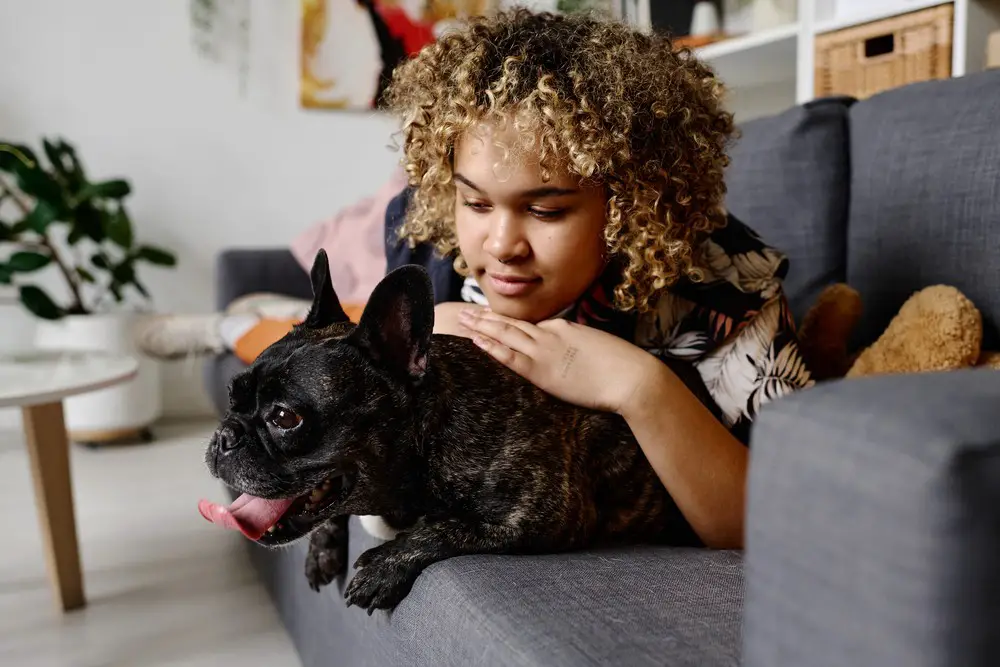As a BetterHelp affiliate, we receive compensation from BetterHelp if you purchase products or services through the links provided
Puppy therapy, a growing trend in mental health and wellness, involves the interaction between individuals and specially trained puppies to provide comfort, stress relief, and emotional support. These adorable, furry companions have significantly impacted people’s lives, providing solace for those struggling with various challenges such as anxiety, depression, and physical health issues.
Puppy therapy stems from the bond humans and dogs have shared for centuries. Researchers attribute the psychological benefits to the release of oxytocin, a hormone associated with social bonding and trust triggered during interactions with dogs. As both individuals and the medical community continue to recognize the value of puppy therapy, its applications to diverse settings, such as schools, hospitals, and rehabilitation centers, help bring relief and healing to those who need it most.
Key Takeaways
- Puppy therapy offers mental health benefits by reducing stress and providing comfort.
- Interacting with puppies triggers the release of oxytocin, promoting social bonding and trust.
- The practice has expanded to various settings, including schools and hospitals, for a wider impact.
 Understanding Puppy Therapy
Understanding Puppy Therapy
Puppy therapy is a delightful and effective approach to providing emotional support and companionship to people in various settings. The sight of a cute puppy wagging its tail can instantly brighten anyone’s day, and their gentle, friendly nature makes them perfect for therapeutic purposes. There’s just something about snuggling with a puppy that can melt away stress and bring warmth and comfort.
Therapy dogs, in general, play a significant role in supporting individuals with diverse needs. Puppy therapy offers similar benefits, with the added charm of younger, cuddly canines. These four-legged companions positively impact places such as hospitals, nursing homes, schools, and even airports, providing comfort and reducing anxiety with their presence.
The premise behind puppy therapy is rooted in the natural bond shared between humans and canines. This connection facilitates emotional support, helping people to feel calm and secure in the presence of these gentle animals. With their irresistible cuteness and exuberance, Puppies are particularly effective in engaging people and promoting a sense of well-being.
It’s essential to understand that therapy puppies are not service dogs; their role primarily focuses on offering emotional support and companionship. They are usually screened and trained to display appropriate behavior for their therapeutic duties, with patience and temperament being highly important factors. After all, these little bundles of joy must be friendly and gentle to be effective as emotional support companions.
In conclusion, puppy therapy is a beneficial and captivating approach to uplifting spirits and promoting emotional wellness. These adorable, empathetic creatures uniquely provide support and make a genuine difference in people’s lives. So the next time you spot a therapy puppy, remember the incredible power within that fluffy fur and wagging tail and allow yourself to embrace the joy it brings.
Psychological Benefits
Puppy therapy brings myriad mental health benefits to those who interact with these adorable, fluffy canines. One might say that their presence is like a breath of fresh air, enveloping people in a warm, fuzzy embrace.
A primary benefit of puppy therapy involves combating depression and anxiety. There’s something undeniably soothing about running your fingers through soft fur as those trusting; innocent eyes gaze back at you. Petting a puppy stimulates the release of oxytocin, serotonin, and dopamine – “feel-good” chemicals in the brain that promote a sense of calm and happiness.
Moreover, these lovable companions can significantly lessen the burden of loneliness. Their unwavering affection and unquestioning loyalty can bring rays of sunshine into even the darkest of days. When life gets too overwhelming, a wet nose or wagging tail might be all it takes to brighten one’s spirits.
Puppy therapy may work wonders in reducing stress, too. The calming presence of a furry friend can serve as a balm for frazzled nerves, enabling people to forget their troubles, if only for a moment. Imagine being greeted by an enthusiastic bundle of joy after a long, hard day – it’s hard not to feel lighter and happier.
The simple, playful antics of puppies also inspire a sense of hope and joy. It’s difficult to resist the charm of their wagging tails, floppy ears, and boundless energy. Observing these tiny creatures navigate the world with curiosity and enthusiasm can serve as a potent reminder of the beauty and possibilities that exist in life.
In conclusion, puppy therapy’s psychological benefits are profound and plentiful. With their unyielding love and energy, puppies have the power to touch hearts, uplift spirits, and promote emotional well-being.
 Physical Advantages
Physical Advantages
Puppy therapy has many marvelous physical benefits you might not be aware of. As you snuggle with a cute little pup, it’s not just emotional magic; your body is also reaping the rewards!
First off, interacting with puppies can help reduce your blood pressure. The soothing effect of cuddling a furry friend can lead to a calmer heart rate. It’s amazing how those tiny paws can gently slow someone’s heartbeat in a jiffy. Plus, it can aid in balancing the overall body rhythm, which you can’t turn a blind eye to.
Additionally, taking a puppy for a walk can encourage you to be more active. It’s not just about the exercise; it’s also about reconnecting with Mother Nature. The little furball running around in circles might also put a spring in your step. So, say adios to dull times and hello to happier, more active days!
Incorporating puppy therapy into your life also leads to an improvement in your overall care routine. As you start to take the responsibility of looking after the pup, you might notice that your self-care game also steps up a notch. Tending to their needs, while remembering to take care of yourself creates a beautiful synergy of mutual care.
In a nutshell, puppy therapy is a delightful way to give you that warm, fuzzy feeling inside and boost your physical well-being. Just remember to draw the line between puppy love and utter obsession!
Role in Healing and Recovery
Puppy therapy, it turns out, plays a remarkable role in healing and recovery. In hospitals worldwide, these adorable furballs bring much-needed comfort to patients. But they don’t just bring smiles; they offer tangible benefits for those on the road to recuperation.
For starters, puppy therapy has been known to boost motivation. When patients interact with these cuddly canines, it sparks a sense of hope and determination. In the face of illness or injury, such interactions help people feel more motivated to push through tough times.
Moreover, our furry friends have some biochemical tricks up their sleeves! Specifically, spending time with puppies can cause an increase in serotonin levels. This mood-boosting neurotransmitter is often called the “feel-good” hormone and is essential in balancing emotions and mental well-being.
Simultaneously, cortisol levels often decrease in the presence of puppies. This stress hormone is commonly associated with heightened emotions and anxiety. By lowering cortisol levels, puppy therapy can effectively reduce stress in those on the mend, promoting faster healing.
Not to mention, the soothing effect puppies have on patients can bolster hope and optimism. Imagine sitting in a sterile hospital room, only to have an unexpected visit from a bouncy puppy, tail wagging, and soulful eyes full of love. It’s no wonder patients find renewed hope in these heartwarming encounters!
In conclusion, puppy therapy is far more than meets the eye. It’s a powerful tool that aids healing and recovery through motivation, hope, and carefully manipulating serotonin and cortisol levels. These lovable creatures’ impact should never be underestimated in helping patients recover.

The Role of Dogs in Schools
Dogs have been stealing hearts for centuries, so it’s no surprise they’ve found their way into schools, positively impacting children of all ages and abilities. Paws down, canine companions have a knack for fostering motivation and engagement among students.
Educational institutions have embraced the presence of these four-legged friends, recognizing the benefits they bring to young minds. Indeed, incorporating dogs into the school environment has proven to enhance social interactions, boost confidence, and ease anxiety. It’s almost as if these furry pals possess a certain magic that turns frowns into smiles and challenges into accomplishments.
Moreover, having a dog in the classroom could support children in overcoming learning difficulties. By providing comfort and a soothing presence, dogs help students focus on their tasks, leaving stress and worries behind. As a result, youngsters can dedicate their energy to gaining knowledge and developing their skills, creating a true learning synergy.
In addition to cognitive benefits, dogs play a significant role in fostering emotional well-being among children. Natural empaths can sense feelings and provide a calming presence to those in need without judgment. This emotional support aids children in mastering self-regulation and coping skills, key aspects of emotional intelligence and resilience.
Imagine this – a child struggling to read aloud suddenly finds courage and fluency when their canine companion is beside them, ears perked and tail wagging. It’s a scene that warms the heart and reveals the potential that lies within every young learner.
To sum it up, dogs in schools do much more than wagging their tails and providing cuddles. These remarkable companions serve as bridges between students, facilitate emotional growth, and guide children on their academic journeys. One thing is for certain – the love, support, and joy that dogs bring to students are truly immeasurable.

Training and Service Standards
In puppy therapy, training and service standards are vital in ensuring these adorable pups can make a difference in people’s lives. It’s no secret that therapy dogs are known for their friendly and accepting nature, making them invaluable companions in various settings within the community.
To become a therapy dog, a puppy must undergo rigorous training to adhere to recognized service animal guidelines. Trainers work diligently with these four-legged friends to teach them vital socialization skills, obedience, and adaptability to new environments. The goal is to prepare them to serve in hospitals, nursing homes, schools, and other places where those in need of furry therapeutic support reside.
It’s important, however, not to confuse therapy dogs with service dogs. While therapy dogs provide emotional support and companionship in various public settings, service dogs perform specific tasks for individuals with disabilities. Regardless, both types of canine heroes must meet strict standards regarding temperament, responsiveness, and being well-groomed.
In many instances, puppies selected for therapy work come from breeds known for their docile and affable temperament, such as Golden Retrievers and Labrador Retrievers. However, don’t be surprised if you stumble upon a mixed-breed therapy dog—they can be just as lovable and effective in bringing smiles to people’s faces!
As the popularity of therapy dogs continues to soar, these furry helpers must meet and maintain proper service standards. After all, their important role in the community relies on their ability to uplift spirits and provide solace in difficult times.
In conclusion, combining comprehensive training and adherence to robust service standards ensures that therapy puppies can provide much-needed comfort and assistance to various individuals within the community. With their delightful presence and accepting nature, these pups undeniably prove that sometimes, unconditional love can make all the difference.
Emotional Support and Mental Health
Puppy therapy holds immense potential in providing emotional support and contributing to improved mental health. Their warm presence and unconditional love help alleviate depression and anxiety symptoms. From wagging tails to loving cuddles, puppies offer comfort like no other therapy source, soothing the emotional troubles of those in need.
For individuals struggling with depression, our article, Best Small Pets for Depression: Discover the Power of Small Pets for Depression Relief showcases how certain small animals positively influence mental well-being. With a unique blend of companionship and emotional backing, these pets enable holistic healing.
When dealing with anxiety, puppy therapy has proven beneficial. Puppies can sense human emotions and respond empathetically, calming comfort during anxious episodes. Through puppy therapy, individuals gain a sense of security, knowing a loyal companion is always by their side.
Besides focusing on immediate emotional relief, puppies also help manage long-term mental health. Consistent interactions with puppy therapy promote a stabilized emotional well-being, letting people cope better with life’s ups and downs.
In conclusion, puppy therapy serves as an exceptional means of emotional support, helping individuals cope with depression and anxiety while nurturing love and stability for improved mental health. With a little furry friend, we’re reminded that companionship is powerful medicine.
Pet Therapy Vs Animal Assisted Therapy
Ah, the warm embrace of puppy therapy! Imagine your day brightened and your stressors melting away while playing with a litter of lovable four-legged friends. Now compare that with the more formal approach found in animal-assisted therapy. The difference between these two can be quite perplexing – so let’s dive right in!
Pet therapy, or having dogs around to provide emotional support and companionship, can work wonders for a person’s mood and mental health. You could say it’s the canine version of “an apple a day keeps the doctor away.” The primary goal of pet therapy is to improve someone’s emotional state, encouraging relaxation and happiness through the comforting presence of their furry companion.
On the other hand, animal-assisted therapy (AAT) is more of a structured, goal-oriented program where therapeutic interventions are incorporated into the mix. AAT usually involves a specially-trained therapy dog and a certified therapist. Together, they help their client improve specific mental or physical health goals. In this context, the dog is more than just a happy-go-lucky friend; their role is actively participating in the healing process.
For instance, while pet therapy might involve a puppy visiting a senior center to brighten the residents’ day, animal-assisted therapy could see a dog guiding someone through physical therapy exercises or helping children with autism develop better social skills.
Despite their differences, there’s no denying the positive impact of pet and animal-assisted therapy on people’s well-being. The key is to find the right approach for each individual and their unique situation. So, whether it’s the casual charm of puppy therapy or the more focused efforts of AAT, the ultimate goal remains the same: helping humans through the unconditional love and support that only our furry companions can provide.
Benefits for the Puppy
It’s an adorable concept. These little fur balls bring joy and comfort to those they interact with, but let’s not forget about our main stars: the puppies themselves! There are undeniable benefits for our four-legged friends as well.
First and foremost, socialization plays a huge role in a puppy’s development. When they participate in therapy sessions, it exposes them to various environments, people, and situations. It helps them become more adaptable and resilient fur babies. Besides, they interact with many friendly faces, showing them love and affection. It’s a win-win!
Another great perk for these puppies lies in the care they receive. As they embark on their therapeutic journeys, they’re often watched by professional handlers and trainers. This ensures they get proper training, nutrition, and grooming, promoting overall well-being and happiness. And who wouldn’t want that for their canine friends?
Puppy therapy is a fantastic way to develop those essential skills that make our animals the best companions they can be. When these bouncy little canines attend therapy sessions, they learn important cues and commands to benefit them. This invaluable training paves the way for better-behaved, well-mannered, and more lovable doggies.
Of course, we can’t leave out the fact that these puppies are positively impacting the lives of so many people. This amazing experience contributes to the puppies’ sense of purpose and fulfillment. After all, they provide a unique, heartwarming service that truly touches lives.
Puppy therapy is a marvelous opportunity for our favorite four-legged friends to grow and thrive. From socialization and skill-building to receiving top-notch care and making a difference in someone’s life, the benefits for these puppies are as clear as day. They are furry balls of love, capable of warming hearts and spreading happiness wherever they go.
Closing Thoughts
Puppy therapy truly brings a unique yet effective approach to therapy animals. These adorable companions’ undeniable benefits are heartwarming, as they foster a sense of warmth, joy, and love within their human counterparts.
An inherent connection forms between these therapy puppies and the individuals they assist. This special bond catalyzes personal growth and healing. Indeed, puppy therapy is a prime example of how the smallest gestures can create the most significant impact.
One cannot overlook the therapeutic elements these furry friends possess, as they effortlessly aid in improving one’s mental and emotional state. The simple act of spending time with them offers undeniable solace for those coping with life’s challenges.
To sum it up, puppy therapy might be the missing puzzle piece many have been searching for in their journey toward emotional well-being. As therapy animals continue to gain recognition in the future, it wouldn’t surprise if puppies become even more celebrated for their astounding ability to heal hearts and uplift spirits.
Frequently Asked Questions
What are the benefits of puppy therapy?
Ah, puppy therapy! Just the thought brings a smile to our faces. Numerous studies have shown that interacting with puppies can provide various physical and mental health benefits. These little bundles of joy can help lower stress levels, reduce feelings of loneliness, and even improve cardiovascular health. Plus, let’s not forget the pure happiness they bring!
How does dog therapy work?
Dog therapy, or canine-assisted therapy, works by leveraging the natural bond between humans and dogs. You know, that warm, fuzzy feeling you get around a furry friend? During a therapy session, a trained therapy dog provides comfort and affection to individuals who may benefit from their presence. Think of it as a soothing paw-sage for the soul!
Where can I find puppy therapy near me?
Thank goodness for the internet! To find puppy therapy near you, check the websites of local organizations specializing in therapy dogs. For recommendations, you might also contact nearby veterinary clinics, pet stores, or animal shelters. Don’t be shy – many trainers and providers will be happy to point you in the right direction.
What is the cost of a puppy therapy session?
The cost of a puppy therapy session can vary, depending on location, duration, and provider. It could range from a nominal fee to a more substantial amount. It’s always wise to shop for something that fits your budget. Just remember, the benefits of puppy therapy (and the delightful puppy cuddles) are priceless!
How do you know if a puppy can be a therapy dog?
An excellent question, indeed! Therapy dogs, including puppies, must possess specific qualities like patience, friendliness, and confidence. They should also be well-behaved, adaptable, and able to handle various environments. Usually, therapy dogs undergo extensive training and evaluations to ensure they are up to the task. Voilà – a certified cuddle companion!
Are there free puppy therapy events or locations?
Good news – yes! Many organizations and universities host free puppy therapy events, particularly during stressful periods like exams or finals. Watch for announcements on social media and your local community bulletin boards. Also, some hospitals and rehabilitation centers may offer free sessions to their patients. Now, who wouldn’t want a free dose of puppy love?
- 3 Ways Wearing a Hat Can Help Lower Your Stress Levels - April 19, 2025
- Breaking the Silence: Why Men’s Mental Health Matters More Than Ever - April 15, 2025
- How to Transform a Home’s Patio Space into a Relaxing Space - March 23, 2025
This site contains affiliate links to products. We will receive a commission for purchases made through these links.


 Understanding Puppy Therapy
Understanding Puppy Therapy Physical Advantages
Physical Advantages
